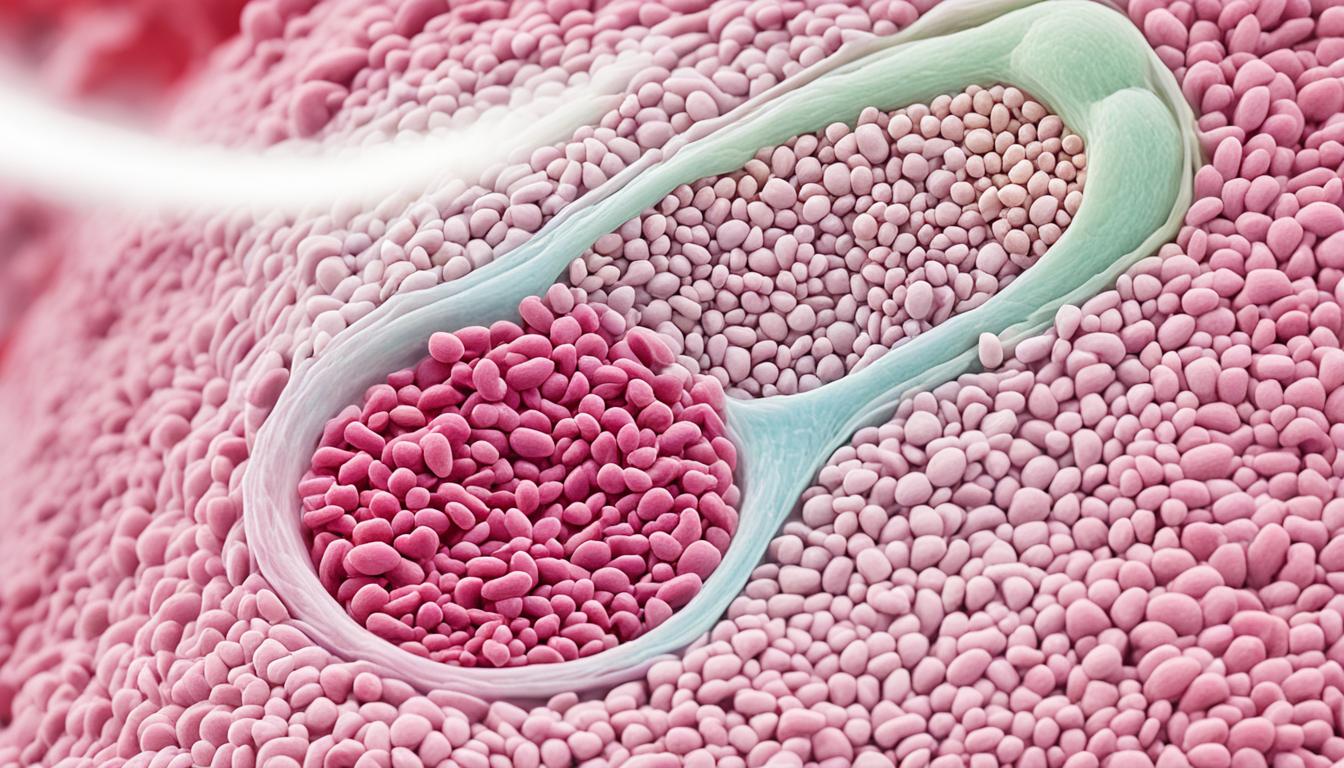Goiter is when the thyroid gland in your neck gets bigger. It’s shaped like a butterfly. This gland makes hormones that control your metabolism. Not having enough iodine, certain diseases, and even being pregnant could cause it. If you’re low on iodine, a woman over 40, or take some medicines, you’re more at risk.
Symptoms include finding it hard to swallow or breathe, a cough, or a hoarse voice. Neck veins may look and feel swollen. Sometimes, you might feel overly energetic or very tired. Doctors use tests to see if you have goiter. These could check your hormone levels, do imaging, or even a biopsy.
Treatments can vary. You might need medicines, a little radioactive iodine, or surgery. Another new method is using stem cells to help treat goiter.
Key Takeaways:
- Goiter means your thyroid is larger than normal. It manages your metabolism with the hormones it makes.
- Not getting enough iodine, certain diseases, or being pregnant may cause goiter.
- If you’re short on iodine, a woman over 40, or on some medicines, you’re more likely to get goiter.
- You might have trouble swallowing or breathing, a cough, a hoarse voice, or see swollen neck veins if you have goiter.
- Doctors use many tests to find out if you have goiter, like checking your hormone levels, doing scans, or even a biopsy.
- Treatments for goiter include medications, a bit of radioactive iodine, or surgery.
- Stem cell therapy is a newer approach that seems promising for goiter treatment.
Note: The image shows an enlarged thyroid gland, which is associated with goiter.
How the thyroid works and causes of goiter
Understanding the thyroid’s function helps know why goiter happens. The thyroid is in the neck and makes hormones like T3 and T4. These hormones control how the body uses energy and its metabolism.
Thyroid Stimulating Hormone (TSH) from the brain starts the thyroid making T3 and T4. It does this by binding to the thyroid cells.
One main reason for goiter is a lack of iodine, which is vital for thyroid hormone production. Without enough iodine, the thyroid can’t make the hormones it needs.
Autoimmune issues can cause goiter too. Hashimoto’s thyroiditis makes the immune system attack the thyroid, leading to it not working well. This can cause goiter and a slow-down in the body’s activities. On the flip side, Grave’s disease makes the thyroid too active, causing goiter and speeding up the body’s actions.
Nodules in the thyroid can also cause goiter, whether there’s one or many nodules. Inflammation, called thyroiditis, and even regular hormonal changes like those during pregnancy can sometimes make the thyroid bigger. Thyroid cancer is another possible reason for goiter.
Knowing how the thyroid and goiter work is key to finding the right treatment.
Who is likely to develop a goiter and symptoms of goiter
Some people are more likely to get a goiter than others. Risk factors for goiter include:
- Low dietary iodine intake
- Being female, as women are more prone to thyroid disorders
- Age over 40
- Certain medications like amiodarone and lithium
- Exposure to radiation
- Hormonal changes during menopause or pregnancy
The signs of goiter change based on its size and what’s causing it. You might notice:
- Difficulty swallowing
- Difficulty breathing
- Coughing
- Hoarseness of voice
- Swelling of neck veins
- Dizziness when raising the arms above the head
If you have too much thyroid hormone, you could feel your heart racing, lose weight, have tremors and diarrhea, and feel very hot. But too little can cause tiredness, weight gain, feeling cold all the time, and having trouble going to the bathroom.
It’s really important to know the risks and about the symptoms of goiter. Early detection and care are key. If you spot these signs or have some of the risk factors, see a doctor for help right away.
| Risk Factors for Goiter | Symptoms of Goiter |
|---|---|
|
|
| Symptoms based on underlying conditions: | |
|
|
Treatment Options
Goiter treatment depends on the cause and how bad the symptoms are. Treatments can be:
- Medicine to fix thyroid hormone levels
- Extra iodine
- Therapy with radioactive iodine
- Having the thyroid taken out with surgery
There’s also stem cell therapy, which sounds really promising for goiter. Right now, it’s in the early stages of research. Scientists are looking into how stem cells could help heal the thyroid.
Stem cell therapy for goiter and conclusion
Stem cell therapy shows a lot of hope in treating goiter, a condition where the thyroid gland enlarges. Studies suggest stem cells can turn into thyroid cells in labs. These can possibly fix the thyroid and bring new treatment ways for goiter.
Tests on animals are promising for using stem cells to help turn goiters smaller and better thyroid work. Plus, they’re looking at fighting thyroid cancer by going after its stem cells.
Even though using stem cells for goiter is still in early stages, it offers a bright future. More work in this area could change how we treat goiter, making the treatments stronger and more focused.
Goiter can happen for many reasons, like not getting enough iodine, diseases attacking the body, or even cancer. Its signs differ, and checking your thyroid health involves tests. Treatments can include taking medicines or having surgery.
With the chance of using stem cells, managing goiter’s outlook is better. It could lead to the thyroid healing itself. So, there’s hope for a better way to deal with goiter in the future.

